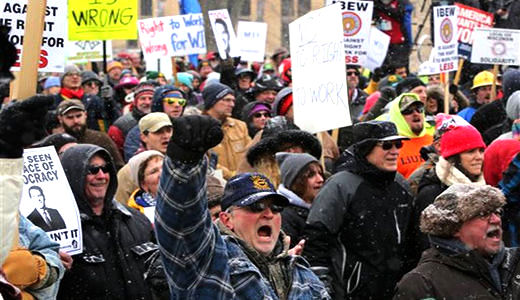
BROWN DEER, Wis. – Even GOP Gov. Scott Walker’s signing of the right-to-work-for-less-law Mar. 9 – making Wisconsin the 25th such state — turned out to be something of a farce. Floor workers at the huge Badger Meter plant here, where the governor held the signing ceremony, were excluded from the signing.
CEO Richard Meeusen had threatened he would close the Brown Deer facility unless the law was passed and promised he would hire at least 30 more people if it was passed. He neglected to point out that any new hire until October 2016 is automatically under a union contract. Nor did he mention how thousands of assembly jobs in Mexico and the Southwest relied on 120 experienced union machinists (IAMAW) in Brown Deer to test the master parts.
Gov. Scott Walker, who ran from the entire idea until he started running for president, changed course because, whether unions like it or not, the talking points from the right have gained traction in a nation that sometimes displays little sense of history.
Many doubt the value of vaccines today because they didn’t live through polio or measles epidemics. They readily believe that what unions accomplished for higher paychecks, weekends, overtime and better benefits are now passé-despite how good the economy was when unions were at their prime.
The national decline in union membership and soaring wage inequity are inescapable twin realities. In combo they ought to make absurd the blaming of unions for fiscal problems, particularly as the right-to-work states are doing so badly in comparison to states with full-blooded worker rights-roughly $5,970 less annual income per worker. A realist has to conclude the only justification for the hatred of unions is the voluntary portion of union political action that are a major boon to liberal Democrats. The conservatives have found a scapegoat for their own failed policies.
“From first to last this has been about politics not economics,” several Republican legislators admitted to me — in private. In public the lone Republican no vote, Sen. Jerry Petrowski, repeated his worries that this bill would have “potentially disruptive impact.” Democratic US Rep. Mark Pocan put it more bluntly: “It was always more about presidential ambition than any pretension of helping businesses.”
But as the dust is still clearing in Wisconsin on how to proceed, business and labor are realizing something else. RTW, as it has been shorthanded, has not been as destructive to private sector unions as extreme advocates intended and no help at all, mainly harm, to the business community.
Many businesses still want to bargain with private sector unions and are dumbstruck when they realize there are new limitations affecting their entire workforce. Even the few big business lobbyists who wanted RTW in ideology still are anxious to use unions in practice – it’s a focused manufacturing and heavy industry workforce. Nor are such groups like Wisconsin Manufacturers and Commerce rushing to find the $35 million in worker training and safety programs needed every year to absorb what state union workers had previously made part of their pay pool. So taxpayers had better get ready to be hit again by the state.
And those workers sucked in by a vision of individual freedom, imagining some yoke was lifted by RTW? Don’t expect a free ride either. This is more “right to work someplace else” if you don’t like the safety rules, benefits and conditions won by unions and now demanded by practical business people.
The new law also warns anyone who encourages union membership to expect a Class A misdemeanor and $10,000 fine, which has raised the specter of coach Mike McCarthy or GM Ted Thompson going to jail for nine months. Under NFL Players Association rules they could be so charged since every Green Bay Packers recruit has to become a union guy. Unlikely to happen because of the publicity backlash, the NFL tells me, but technically possible.
Private sector unions are bitter at being punished for no reason – several believed Walker when he said even last September (when he needed their votes) that he would not push for RTW. Now they’ve turned full circle. No one in the Capitol embarrassed Terry McGowan, president of Operating Engineers 139 (IUOEU), with reminders of how in 2011 he “took Walker at his word” about no RTW, because McGowan truly had inroads to the GOP as a champion of admired tough road workers. He testified forcefully in March calling his many conservative members “gun toting, beer drinking, pickup driving rednecks against right-to-work.”
“No business model can survive without charging for services,” he pointedly told a friendly Republican questioner. When asked what would happen to the new state of the art $10.5 million indoor training facility his members had just funded out of their pay, McGowan suggested it would become “the largest potato storing facility in Waushara County” unless the legislators changed their minds. They didn’t.
Unions have already gone to court to get an injunction, fighting along lines previously attempted in Indiana to little avail about property rights.
The AFL-CIO, United Steelworkers and IAMAW (machinists) argue they are being obligated to “provide services to those who do not pay for them.”
The Dane County Court ruled today that it will not grant the unions their injunction because they could not prove “irreparable harm.” The unions say the law could encourage huge numbers of people to tale advantage of a situation in which the unions are forced to provide a service for which they cannot be paid. “Irreparable harm,” they say, could well be the result.
Photo: Local 95 UAW attends a rally against the right-to-work bill outside the Wisconsin State Capitol in Madison, Feb. 25. | Amber Arnold/AP












Comments